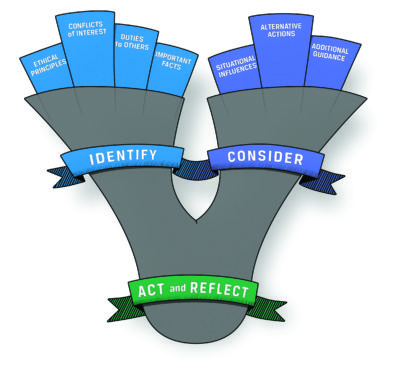Ethics in Practice: Employment Disputes. Case and Analysis–Week of 24 September
Check out the analysis to see how you did in analyzing this week’s case (24 September) and determining which CFA Institute Standard was involved.
Case
Clifford, a senior partner at an investment advisory firm, hires McDougal as a junior analyst on a temporary basis with the understanding that if her work performance is satisfactory after three months she will be hired full time. At the end of the three months, although McDougal’s research work is satisfactory, she has had a number of conflicts with several male employees at the firm. Clifford tells McDougal that because of firm restructuring, a full-time position is no longer available, and McDougal is not given a position after her temporary employment contract expires. McDougal files a complaint with securities regulators and CFA Institute alleging various securities violations against Clifford and the firm.
After an investigation, the complaint was found to be meritless. As part of the investigation, Clifford was able to prove that McDougal had been hostile to firm employees, used inappropriate language, and made threats against Clifford when she was not hired on full time. Clifford also produced emails and messages that McDougal sent to firm clients that falsely claimed Clifford was going to lose his CFA® designation because of the investigation by regulators and CFA Institute. After McDougal’s complaint against Clifford and the firm was dismissed, the firm once again advertised a position for a full-time junior research analyst. Choose the best response from the following choices:
- Clifford violated the CFA Institute Standards of Professional Conduct.
- McDougal violated the CFA Institute Standards of Professional Conduct.
- Although Clifford’s actions may be inappropriate, he did not violate the CFA Institute Standards of Professional Conduct.
- Although McDougal’s actions may be inappropriate, she did not violate the CFA Institute Standards of Professional Conduct.
Analysis
This case relates to CFA Institute Standard I(D): Misconduct, which states that CFA Institute members must not engage in any professional conduct involving dishonesty, fraud, or deceit or commit any act that reflects adversely on their professional reputation, integrity, or competence. In this case, McDougal’s conduct clearly violates this standard. Certainly, the combination of making false allegations to regulators against your employer, filing a meritless complaint with CFA Institute, using inappropriate language in the workplace, making misrepresentative and disparaging comments to firm clients, and threating your supervisor all can be considered professional conduct involving dishonesty, fraud, and deceit as well as conduct that reflects adversely on professional reputation, integrity, and confidence. Clifford’s conduct, however, falls into a gray area. Although he did not hire McDougal after promising to do so and uses the excuse of a seemingly fictitious corporate restructure when informing her about her termination, those actions may not rise to the level of “misconduct” contemplated by the standard. McDougal’s research work may have been adequate, but her not fitting in well with colleagues or the firm culture could very well be a valid reason not to offer her a full-time position. Although she may have had conflicts with some male colleagues, there is no indication that her failure to receive a full-time position was because of her gender. Finally, although Clifford’s claim that the junior research analyst position was eliminated may have been false, some may see using the excuse of a phantom work restructuring as a gracious way for Clifford and the firm to disentangle themselves from an unwanted employee. In any event, McDougal’s subsequent conduct seems to show that Clifford made the right call on any future employment. Because McDougal’s conduct clearly violates Standard I(D), choice B is the best answer.
This case is based on a recent CFA Institute Professional Conduct Investigation.
Have an idea for a case for us to feature? Send it to us at [email protected].
More About the Ethics in Practice Series
Just as you need to practice to become proficient at playing a musical instrument, public speaking, or playing a sport, practicing assessing and analyzing situations and making ethical decisions develops your ethical decision-making skills. The Ethics in Practice series gives you an opportunity to “exercise” your ethical decision-making skills. Each week, we post a short vignette, drawn from real-world circumstances, regulatory cases, and CFA Institute Professional Conduct investigations, along with possible responses/actions. We then encourage you to assess the case using the CFA Institute Ethical Decision-Making Framework and through the lens of the CFA Institute Code of Ethics and Standards of Professional Conduct. Then join the conversation and let us know which of the choices you believe is the right one and explain why. Later in the week, we will post an analysis of the case and you can see how your response compares.
Image Credit: ©CFA Institute


A) Clifford should have confronted her about her misconduct with the male staff.